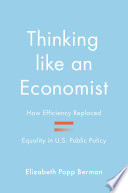Product desciption
Thinking Like An Economist How Efficiency Replaced Equality In Us Public Policy Elizabeth Popp Berman by Elizabeth Popp Berman 9780691167381, 0691167389 instant download after payment.
"Economics is the queen of the social sciences, and economists are among the most prominent of experts in Washington. No other discipline has its own office in the White House, is as visible in the New York Times, or as frequently mentioned in the Congressional Record. Yet at the same time, the limits on economists' influence are quite clear. Their advice is often ignored until it is politically convenient, and as the current moment shows, politicians can cut experts out of the loop entirely. The sharp contrast between economists' overwhelming support for pricing carbon emissions and the complete lack of federal climate action provides a particularly keen demonstration of these limits. So how does economics matter to the policy process? In Thinking Like an Economist: How Economics Became the Language of U.S. Public Policy, Popp Berman argues that while economists' policy advice may sometimes have an impact, the spread of an economic style of reasoning - basic microeconomic ideas about efficiency, tradeoffs, incentives, choice and competition, spread through professional schools and institutionalized through organizational and legal change - has had more fundamental effects. Although economists had influence in a handful of policy domains by mid-century, between the 1960s and the 1980s the economic style circulated and was stabilized in a range of new locations. Much of this change was driven by two intellectual communities: a group of systems analysts who came from RAND with new answers to the question "How should government make decisions?", and a network of industrial organization economists, centered first at Harvard and later Chicago, who asked "How should government regulate markets?" These two communities helped spread economics to law and public policy schools, established economic reasoning in a range of organizations in and around government, and in some cases institutionalized legal requirements for use of the economic style. Built upon five years of research, the book makes comparisons across a number of policy domains, including primary case studies of antipoverty, antitrust, and environmental policy, as well as episodes from education, housing, labor, transportation, health, and communications policy. Drawing on historical evidence from nine archives, more than a hundred previously collected oral histories, and thousands of primary and secondary sources, it provides a new answer to the question of why U.S. politics took a lasting rightward turn during the 1970s, and new ideas about what it might take to reverse that change - not the rejection of economics, but an honest grappling with its political effects"--


